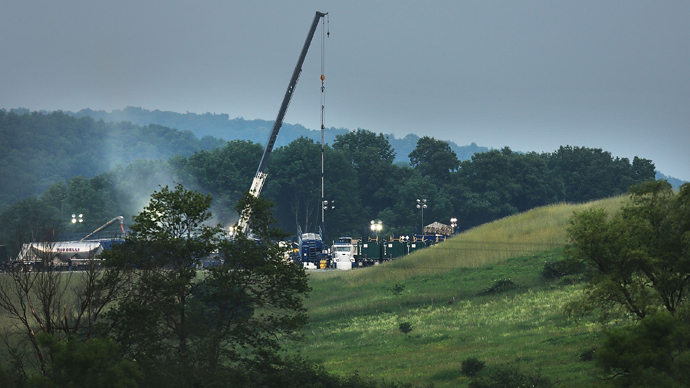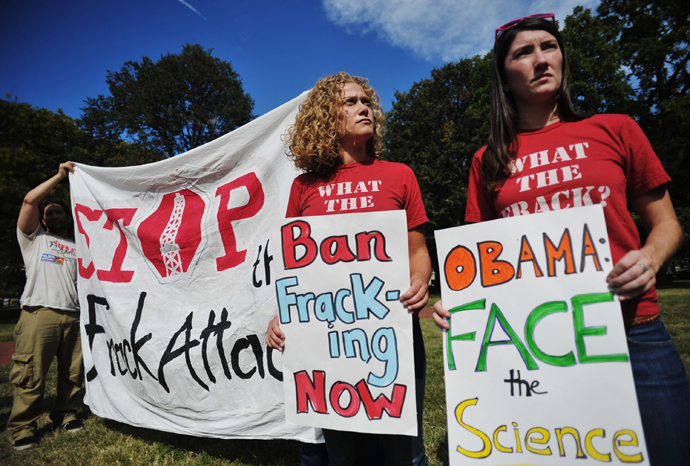Money & influence: Oil & gas co’s hush threats of fracking

Oil and gas companies still manage to hush threats to fracking using money and huge political power, despite people rising against the practice all over the world, Rose Braz, climate campaign director at the Center for Biological Diversity, told RT.
RT:Ukraine has signed a 50-year agreement with Chevron to explore and produce shale gas, while Romania has also struck a deal with the energy corporation. But Germany's E.ON says fracking is not a game-changer in Europe. Why is Ukraine still going ahead with it? Do you think it could be a game-changer?
Rose Braz: Well, the reality is, at least as far as in the US, fracking wells tend to fall off very quickly. It tends to be a boom-and-bust cycle here and the long-term impacts to our health, our air, our water and our climate are costs that are not factored in when countries, states, entities start moving forward with shale gas exploration and fracking.
RT:Could you break down the fracking technology for us? It's said to be cost-effective, but also possibly damaging to the environment. How true is that?
RB: Fracking involves using millions of gallons of water laced with sand and toxic chemicals, there are over 632 different chemicals used in fracking. They inject these liquids deep underneath the ground to break apart shale formations holding oil and natural gas. And fracking has been associated with air pollution, water contamination, water depletion, earthquakes, and of course climate change, you know, across the US and internationally. That is why you are seeing countries like France having a ban on fracking, states like New York currently having moratorium on fracking, and movements across the world seeking a ban on fracking.

RT:If fracking is so dangerous and there are movements across the world, why is there no progress in banning it?
RB: Oil and gas companies have spent billions of dollars on selling us the story about how fracking is safe and the reality is quite different. Here in the US we have communities from Wyoming to Texas and Pennsylvania where people literally cannot drink their water and we have earthquakes in places like Oklahoma and Arkansas that are not prone to earthquakes, from the underground injection of fracking wells. We have air pollution problems from drilling and fracking particularly here in California, in Central Valley. These threats are just been put undercover, quieted by oil and gas companies, which often get confidential settlements with people who are desperate to get some compensation for the damages that they have suffered. So I mean oil and gas companies have certainly run very powerful campaigns, but I think what we are seeing is just more and more evidence, more and more grassroots pressure from the people living with the fracking wells - literally sometimes in their backyards - who are coming forward and say it’s not a story, it’s not an experience they are having.
RT:Recent reports show that the use of fracking technology could have caused over one hundred earthquakes in Ohio, which is not normally prone to seismic activity. What environmental changes could follow fracking?
RB: The reality is, I think, if the typhoon that just struck the Philippines is another horrible reminder that the climate change is here now. You have the international energy agencies saying ‘we need to keep at least two-thirds of our known fuel reserves underground, not burn them in order to avoid the worst impacts of climate change and a great place to start keeping these fossil fuels underground would be with these unconventional risky techniques like fracking that are breaking apart shale formations, but also breaking apart landscapes, polluting our air, endangering our water and impacting our climate. If we don’t start now with these very risky techniques, I don’t know if we are ever going to get there.
RT:Western Europe seems very skeptical about fracking. France banned it in 2011 and Germany has agreed to a temporary moratorium, until there's enough data on its impact on water quality. Why are countries like Ukraine so eager to proceed then?
RB: I think that, unfortunately, particularly here in the US, oil and gas companies give a lot of money to people running for political office. I think they hold an enormous amount of power here in California, where I am. The bill that governs fracking was pending in our state the legislature. The Western States Petroleum Association took about a dozen lawmakers out for a $13,000 dinner. These stories are not uncommon, and the power of oil and gas in electoral politics is huge, so we also need to address that. I think, however, what we are also seeing is the power of people in the grassroots across this country and others really rising up. Recently in Colorado, for example, which is extremely fracked, probably the most-fracked state in the country, we saw four communities pass moratoriums or bans on fracking in the last election just a couple of weeks ago. And we are seeing Native American communities rising up and communities, as we said, in France, in New York and California fighting for bans or moratorium on fracking. Ultimately, that’s going to overtake the power of oil and gas, but oil and gas are certainly putting up a good fight.
The statements, views and opinions expressed in this column are solely those of the author and do not necessarily represent those of RT.
The statements, views and opinions expressed in this column are solely those of the author and do not necessarily represent those of RT.











